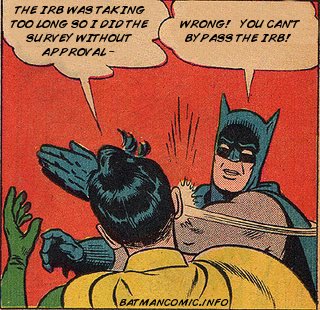made at http://www.batmancomic.info/ in response to this passage in christopher cox’s “hitting the spot,” published in the serials librarian 53(3), 2007:
The university has strict human subject rules, and each survey proposal must be reviewed by the Institutional Review Board, a process which takes about a month. Due to time constraints, the author had no choice but to employ a more haphazard approach. Surveys were gathered in three ways: a link was posted on the library Web site and an announcement put in the library’s monthly student e-newsletter. This garnered about six responses. An e-mail was next sent to all library student supervisors, asking student workers to fill out the survey. This yielded 45 more surveys. Finally, in order to gain a more representative campus sample, copies of the survey were printed and distributed to willing parties outside various academic buildings throughout campus (six in all) during the second-to-last week of classes. 94 surveys were collected using this method. This brought the total to 145 completed surveys. The majority of survey respondents (n = 135 or 94%) were students, with only 2 faculty members and 6 staff members completing the survey. Student responses were the primary target of the survey, so this result was satisfactory for us.
So, what’s the big deal, you may ask. When a researcher wants to do a study that involves humans his/her study proposal may need to go through an evaluation by a group of researchers charged with making sure that the rights and welfare of the humans used in the study is protected. That group of researchers is called an Institutional Review Board (IRB). The reviewers may ask the researcher to change parts of his/her study design to make sure that a participant is safe and enters into the study willingly and informed of any risks. At the end of a review by an IRB the researcher can be certain that his/her project is ethical. By deliberately bypassing the IRB step which the author states that his university requires, the above-quoted researcher chose an unethical path.
Libraries are viewed as trusted entities, and research like Cox’s chips away at that trust. I am really disappointed to have read this article in an international peer-reviewed journal. This research should have been rejected on the basis of the giant flaw in the research design of bypassing the IRB review. The HHS Web site says it nicely, “The value of research depends upon the integrity of study results.”




I hadn’t been aware of the Cox article, although there is, unfortunately, a lot of this kind of stuff in the library literature. What particularly annoys me in this excerpt is, “Due to time constraints, the author had no choice but to employ a more haphazard approach…” That line alone would’ve gotten the article tossed out of the JMLA while I was editor.
How in the world can you take this “research” seriously when the author says something like that? But then, with just a few exceptions, the (formerly) Haworth journals have ever had only a nodding acquaintance with the notion of “peer review”.